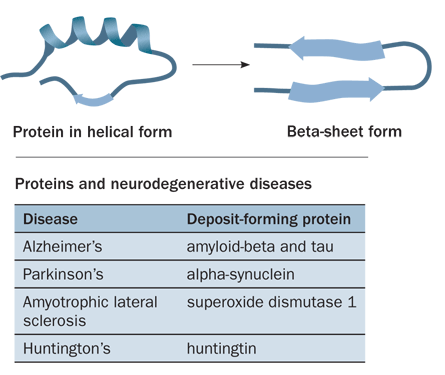Like a prion, Alzheimer’s protein seeds itself in the brain
Misshapen amyloid-beta self-propagates in mice
The Alzheimer’s-related protein amyloid-beta is an infectious instigator in the brain, gradually contorting its harmless brethren into dangerous versions, new evidence suggests. The study adds to the argument that A-beta is a prion, a misfolded protein that behaves like the contagious culprits behind Creutzfeldt-Jakob disease in people, scrapie in sheep and mad cow disease.


There’s no evidence that Alzheimer’s can spread from person to person, but thinking of Alzheimer’s as a prion disease could change the way researchers approach treatment and prevention strategies. The results also raise troubling implications for people who participated in a clinical trial in which they received a form of A-beta made in the lab, Stanley Prusiner of the University of California, San Francisco and colleagues write online June 18 in the Proceedings of the National Academy of Sciences.
In the study, the researchers injected purified A-beta protein to seed one side of mice’s brains and monitored it with a fluorescent molecule that became visible as the protein accumulated. After about 300 days, the A-beta had accumulated throughout the brain, similar to what happens in Alzheimer’s. “It really does spread,” says study coauthor Kurt Giles of UCSF. “We inoculate in one part of the brain but the pathology spreads through the whole brain.”
The most devastating kind of A-beta was that taken directly from the brains of other mice and purified, the team shows. But a synthetic version also spread, albeit slower than the brain-derived A-beta. Previous studies have hinted that A-beta acts like a prion, but no one had successfully shown that, on its own, synthetic A-beta could kick off a cascade of misfolding among the brain’s native A-beta. By demonstrating this, the researchers prove that A-beta can act as a seeding agent, says neurobiologist Mathias Jucker of the University of Tübingen in Germany. “It’s very, very beautifully shown.”
The team couldn’t determine the actual shapes of the A-beta injected into the mice, nor did researchers look for behavioral changes in the mice, but plan to study those issues in the future.
Neuroscientist George Bloom of the University of Virginia in Charlottesville points out that the study doesn’t rule out an alternative explanation for the effect of the A-beta inoculations. The extra A-beta could be changing the flux of A-beta production or clearance, which would then result in A-beta accumulation, he says. But the data are convincing, he says. “It sure looks and smells a lot like prion disease.”
From the study, it’s not clear what form of A-beta is responsible for the prionlike activity. Small forms called oligomers or large clumps of fibrils could be to blame for the spreading. Nor is it known what accounts for the different potencies of the brain-derived and synthetic A-beta.
In a clinical trial halted in 2002, people with mild to moderate Alzheimer’s were immunized with synthetic A-beta in an effort to clear their brains of A-beta buildup. If synthetic A-beta behaves like a prion, these people could face a heightened risk for A-beta buildup, Giles and colleagues write. There’s currently no evidence of this, says pathologist Eliezer Masliah of the University of California, San Diego. “Even though it’s something to be aware of, I think the likelihood of that is very small.”
Back Story | SHAPE-SHIFTING PROTEINS AND DISEASE
Bacteria, viruses and parasites can cause infections, but so can misshapen proteins called prions. Prions’ infectivity comes from a self-propagating change in shape. In prions, the innocuous form of a protein often contains helical twists that can be converted to flat beta-sheets (although this can be a normal form for proteins too). For unknown reasons, this flat conformation can incite other proteins of that species to shape-shift too, sometimes forming toxic deposits. For amyloid-beta protein, the suspected culprit in Alzheimer’s disease, the exact shape change isn’t known. But new work suggests that Alzheimer’s can be added to a growing list of brain disorders that share some key features with prion diseases. In the June 22 Science, Stanley Prusiner of UCSF argues that a prion-based explanation unites a wide array of neurodegenerative diseases, all of which may stem from misfolded proteins self-propagating through the brain.
 Illustration: T. Dubé; Source (table): S. Prusiner/Science 2012
Illustration: T. Dubé; Source (table): S. Prusiner/Science 2012







